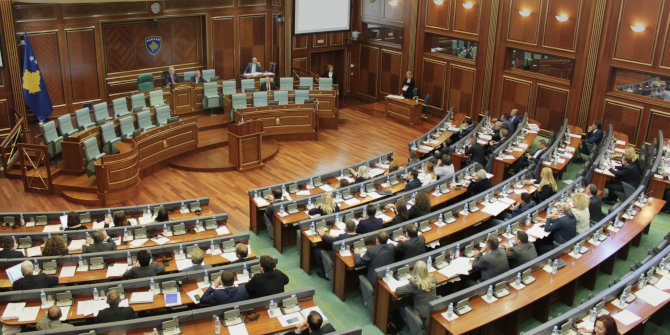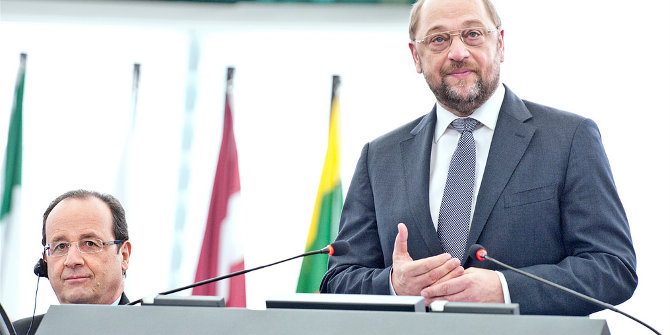Research suggests that citizens across Europe have reservations about the democratic values that underpin EU cohesion policy. Using focus group data, Carlos Mendez, Andreja Pegan and Vasiliki Triga explore citizens’ views and call for the introduction of democratic innovations to improve the policy’s legitimacy and effectiveness.
The EU’s cohesion policy invests billions of euros to help reduce regional disparities and improve citizens’ lives. But is the public value of the EU’s largest investment policy recognised by citizens themselves?
In a new study using focus group data across 16 European regions, we find that citizens recognise the success of the policy in achieving formal goals but express concerns about its institutional performance and democratic value. This reveals a public values gap that compromises the policy’s overall effectiveness. To bridge this gap, we advocate for citizen co-creation through democratic innovations such as participatory budgeting and citizen juries to enhance legitimacy and effectiveness.
EU cohesion policy and public values
To understand public perceptions of EU cohesion policy, it is crucial to explore the public values it produces. Building on Mark Moore’s seminal work, our focus group discussions identified four key public values emanating from EU cohesion policy, as seen by citizens.
The first public value is goal-attainment. This includes impacts such as convergence and development, as well as outputs and results like infrastructure development, business creation and skills development. The second is institutional, focusing on management effectiveness, compliance and administrative capacity at the programme and project levels. The third is democratic, incorporating democratic accountability, responsiveness and public deliberation. The final value is social-political, covering broader societal and political consequences related to equity/efficiency and identity.
Interestingly, while EU policymakers tend to prioritise goal attainment (as evidenced by the analysis contained in successive EU Cohesion Reports), citizens place comparable weight on institutional and democratic values, although with reservations. We argue that this dissonance produces “value incoherence”, creating fertile ground for public value failure.
A roadmap for change
In a climate marked by public discontent and polarisation, preventing public value failure in the EU should be imperative. While regulatory reforms in EU cohesion policy, such as strengthening the partnership principle or promoting localised territorial instruments, have been introduced to enhance governance and bring the policy closer to citizens, their impact on citizen engagement has been limited. This is primarily because citizens are not involved directly in decision-making over the allocation of cohesion funding at programme or project level.
Importantly, the onus of public value creation does not lie solely with policymakers or experts. Citizens also have a crucial role to play. To enhance public value creation, we propose a “five C’s framework” incorporating: coherence, where the EU adopts a balanced approach that weights all dimensions of public value equally; communication, where the EU employs effective communication strategies to elevate public awareness and trust; co-creation, with citizens being encouraged to become active contributors rather than mere policy beneficiaries; capacity, where the EU invests in resources to foster citizen engagement, particularly among marginalised groups; and continuous feedback, in which the EU maintains ongoing dialogue with citizens to assess and adapt policy iteratively.
To narrow the public values gap, we recommend policy reforms that facilitate a citizen-centric approach. This could include dedicating a share of EU funding in programmes to participatory budgeting or deliberative mechanisms like citizen juries and panels. Such initiatives enable citizens to have a direct say over public investment decisions, thereby fulfilling a core democratic value that remains overlooked at the EU level. We urge the Council, European Commission and the European Parliament to champion these reforms.
Incorporating co-creation can significantly enhance the institutional and democratic values that citizens find lacking in the current cohesion policy. This requires a holistic approach that acknowledges all facets of public value, ensures transparent government communication, allocates resources for public engagement and establishes a system for continuous feedback. By adopting such a model, the EU will not only bring Europe closer to its citizens but will also contribute to the EU’s democratic legitimacy and territorial cohesion goals.
For more information, see the authors’ accompanying paper in Public Management Review
Note: This article gives the views of the authors, not the position of EUROPP – European Politics and Policy or the London School of Economics. Featured image credit: European Union





